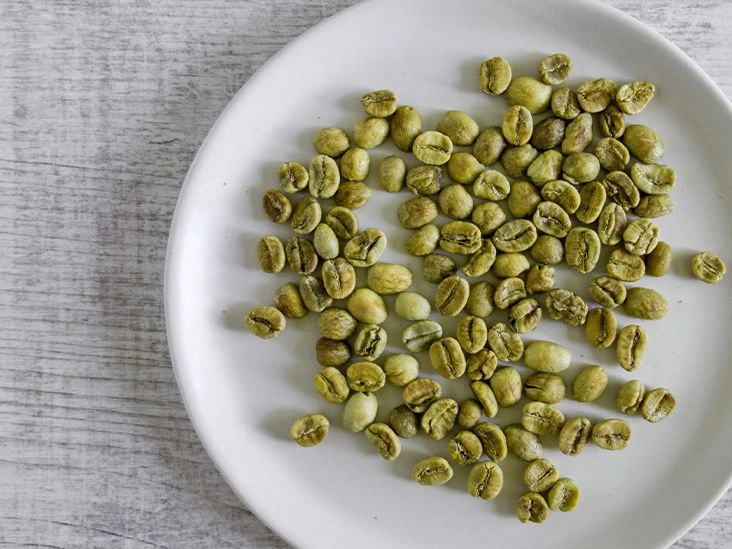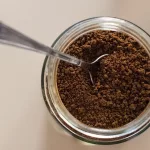Green coffee is becoming more prevalent within the health and wellness scene.
Consequently, you may have come across claims about its plentiful supply of beneficial plant compounds.
This piece examines green coffee in detail, covering its possible advantages and downsides.

What is green coffee?
Green coffee beans are simply standard coffee beans that have not been roasted and remain in their raw state.
The extract is widely sold as a dietary supplement, but you can also buy whole green beans and brew them into a hot drink, similar to roasted coffee.
Keep in mind that a cup of this pale green beverage won’t taste like the roasted coffee you’re familiar with; its flavor is much milder. Many describe it as more akin to an herbal tea than traditional coffee.
Additionally, its chemical makeup differs considerably from roasted coffee, despite the same botanical origin.
It contains a notably high amount of chlorogenic acids — molecules with strong antioxidant and anti-inflammatory properties that may offer multiple health effects.
Roasted coffee also contains small quantities of chlorogenic acids, but most are destroyed during the roasting process.
SummaryGreen coffee beans are unroasted, raw coffee beans. They are rich in a group of antioxidants called chlorogenic acids, which are believed to provide several health advantages.
Does it work as a weight-loss supplement?
In 2012, green coffee extract was touted as a miraculous weight-loss remedy by American celebrity physician and TV host Dr. Oz.
Many health professionals have since dismissed the idea that it produces any substantial weight reduction.
Despite this, green coffee extract continues to be one of the more popular weight-loss supplements available.
Some small animal studies treated mice with the extract and observed notable reductions in body weight and fat accumulation. However, human trials have been much less definitive.
Most human research on green coffee has been inconclusive. Although some participants lost weight, those studies were poorly designed, had small sample sizes, and were of short duration.
Therefore, there is no conclusive proof that green coffee effectively promotes weight loss. Larger, well-designed human trials are necessary.
SummaryGreen coffee is advertised as a weight-loss aid, but scientific support for its effectiveness is lacking. Further human research is required.
May lower the risk of certain chronic diseases
Green coffee might offer health benefits beyond weight management.
Its chlorogenic acids may help lower the risk of chronic conditions such as type 2 diabetes and cardiovascular disease.
In an 8-week trial, 50 people with metabolic syndrome — a cluster of risk factors including elevated blood pressure and blood sugar that increase the risk of diabetes and heart disease — took 400 mg of decaffeinated green coffee bean extract twice daily.
Participants who took the extract showed significant improvements in fasting blood glucose, blood pressure, and waist circumference compared with a control group.
While these findings are encouraging, larger studies are still needed.
SummaryGreen coffee may help lower your risk of heart disease and type 2 diabetes, though more research is warranted.
Possible risks and side effects
Green coffee is generally considered safe but carries several potential risks.
Effects of excess caffeine
Like roasted coffee, green coffee beans naturally contain caffeine.
Although moderate caffeine consumption is probably safe for most healthy individuals, excessive intake can produce adverse effects such as anxiety, sleep problems, and elevated blood pressure.
One 8-ounce cup of either black or green coffee provides about 100 mg of caffeine, depending on the bean and brewing technique.
Because some caffeine is lost during roasting, green coffee may have slightly more caffeine than roasted coffee, but the difference is likely minor.
Green coffee supplements commonly deliver 20–50 mg per capsule, though some products are decaffeinated during processing.
If you use green coffee in any form, consider moderating your consumption to avoid unwanted effects.
May impact bone health
A 2-month animal study found that mice given daily green coffee extract experienced notable calcium loss in bone tissue.
These findings suggest that prolonged use of green coffee supplements could be detrimental to bone health.
However, human studies are required to confirm these effects.
SummaryToo much caffeine from green coffee could cause adverse symptoms. Early animal research also indicates it might harm bone health, though human research is needed.
Suggested dosage
There isn’t enough data on green coffee to define precise dosing guidelines.
That said, at least one study used up to 400 mg of green coffee extract twice daily without reporting adverse effects.
If you’re thinking about taking this extract, consult your healthcare provider to determine a safe dose.
SummaryNo standard dosing guidelines exist for green coffee, but some trials have safely used doses up to 400 mg of extract twice per day.
The bottom line
Green coffee refers to the unroasted beans of the coffee plant.
Its extract gained popularity as a weight-loss supplement, and it may support healthy blood sugar and blood pressure levels, although evidence on its effectiveness is limited.
Few side effects have been reported, but its caffeine content can cause adverse reactions.
Before adding green coffee to your regimen, speak with your healthcare provider to ensure it’s appropriate for you.
You can also brew the whole beans into a hot drink.
If you want to try green coffee or its extract, you can buy whole beans and supplements online.

























Leave a Reply
You must be logged in to post a comment.